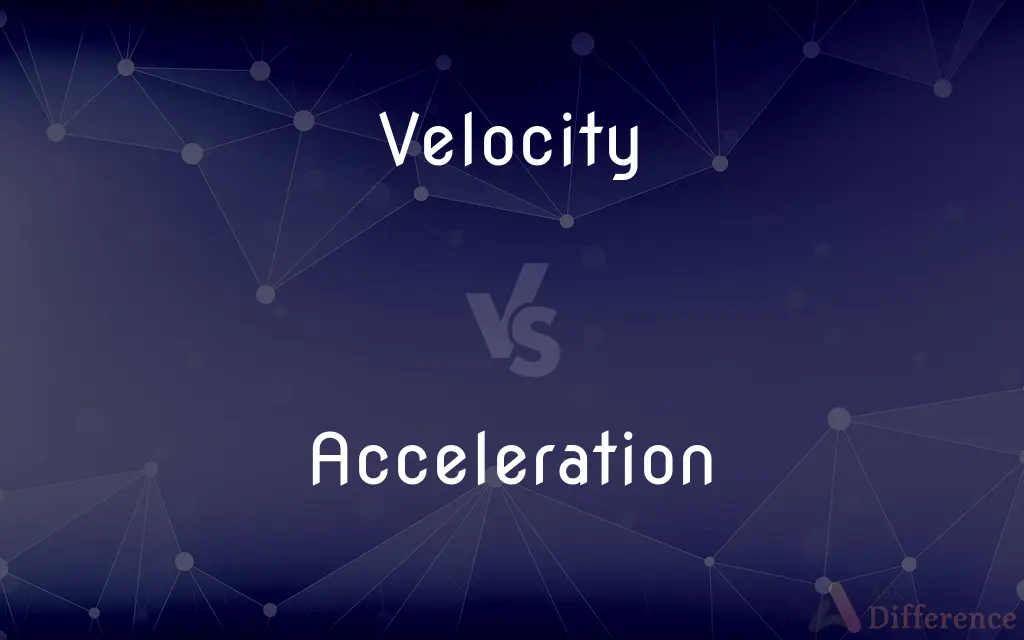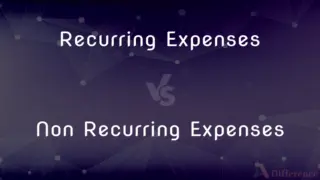Velocity vs. Acceleration — What's the Difference?
Edited by Tayyaba Rehman — By Fiza Rafique — Published on October 6, 2023
Velocity is the speed of an object in a specific direction. Acceleration is the rate at which velocity changes over time. Both are vector quantities.

Difference Between Velocity and Acceleration
Table of Contents
ADVERTISEMENT
Key Differences
In calculus terms, velocity is the first derivative of the position function with respect to time. Acceleration is the first derivative of the velocity function or the second derivative of the position function with respect to time. Both velocity and acceleration are fundamental in the study of motion, mechanics, and various fields of physics.
Fiza Rafique
Oct 06, 2023
Velocity is often constant in problems where there are no forces acting on an object or the forces are balanced. Acceleration occurs when there is an unbalanced force, leading to a change in velocity. It's possible to have a high velocity and zero acceleration, just as it's possible to have zero velocity and high acceleration.
Fiza Rafique
Oct 06, 2023
When it comes to units, velocity is usually expressed in meters per second (m/s), while acceleration is expressed in meters per second squared (m/s²). Both units reflect their different natures; velocity is about distance over time, and acceleration is about velocity over time.
Fiza Rafique
Oct 06, 2023
Velocity is the measure of how fast an object moves and in what direction. Acceleration, on the other hand, indicates how quickly an object changes its velocity, also with direction. Velocity is essentially a snapshot of an object's speed and direction at a specific moment in time, while acceleration represents the change in that snapshot.
Fiza Rafique
Oct 06, 2023
Velocity is a vector quantity that can be positive, negative, or zero, providing a complete picture of motion in terms of both magnitude and direction. Acceleration is also a vector quantity, but it's focused on how the velocity vector changes over time, which could mean an increase or decrease in speed, or a change in direction.
Fiza Rafique
Oct 06, 2023
ADVERTISEMENT
Comparison Chart
Vector
Yes, has both magnitude and direction
Yes, has both magnitude and direction
Fiza Rafique
Oct 06, 2023
Calculus
First derivative of position
Second derivative of position or first derivative of velocity
Fiza Rafique
Oct 06, 2023
ADVERTISEMENT
Definitions
Velocity
Velocity is often represented by the symbol
In the equation v=u+at, v is the final velocity.
Fiza Rafique
Sep 22, 2023
Acceleration
Acceleration is the rate at which velocity changes.
The sports car had an acceleration of 5 m/s².
Fiza Rafique
Sep 22, 2023
Velocity
Velocity can be zero if an object is at rest relative to a reference point.
The velocity of the parked car was zero.
Fiza Rafique
Sep 22, 2023
Acceleration
Acceleration is also a vector quantity.
The moon has a downward acceleration of 1.6 m/s².
Fiza Rafique
Sep 22, 2023
Velocity
Velocity is the speed of an object in a particular direction.
The car had a velocity of 60 mph going north.
Fiza Rafique
Sep 22, 2023
Acceleration
Acceleration is represented by the symbol
The equation a= tΔvdefines acceleration.
Fiza Rafique
Sep 22, 2023
Velocity
Velocity is a vector quantity describing both magnitude and direction.
The airplane's velocity was 300 m/s to the east.
Fiza Rafique
Sep 22, 2023
Acceleration
Acceleration occurs when there is an unbalanced force on an object.
The roller coaster experienced rapid acceleration as it went downhill.
Fiza Rafique
Sep 22, 2023
Velocity
Velocity is constant when no forces are acting upon an object.
The asteroid had a constant velocity as it moved through space.
Fiza Rafique
Sep 22, 2023
Acceleration
Acceleration can be positive, negative, or zero.
The car had a negative acceleration as it decelerated.
Fiza Rafique
Sep 22, 2023
Velocity
The velocity of an object is the rate of change of its position with respect to a frame of reference, and is a function of time. Velocity is equivalent to a specification of an object's speed and direction of motion (e.g.
Fiza Rafique
Oct 17, 2021
Acceleration
In mechanics, acceleration is the rate of change of the velocity of an object with respect to time. Accelerations are vector quantities (in that they have magnitude and direction).
Fiza Rafique
Oct 17, 2021
Velocity
The speed of something in a given direction
The velocities of the emitted particles
Fiza Rafique
Oct 17, 2021
Velocity
(Physics) A vector quantity whose magnitude is a body's speed and whose direction is the body's direction of motion.
Fiza Rafique
Oct 17, 2021
Acceleration
Abbr. a(Physics) The rate of change of velocity with respect to time.
Fiza Rafique
Oct 17, 2021
Velocity
The rate at which something acts or occurs
The velocity of metabolism of glucose in muscle cells.
Fiza Rafique
Oct 17, 2021
Acceleration
(uncountable) The act of accelerating, or the state of being accelerated; increase of motion or action; as opposed to retardation or deceleration.
A falling body moves toward the earth with an acceleration of velocity
Fiza Rafique
Oct 17, 2021
Acceleration
(countable) The amount by which a speed or velocity increases (and so a scalar quantity or a vector quantity).
The boosters produce an acceleration of 20 metres per second per second.
Fiza Rafique
Oct 17, 2021
Velocity
(physics) A vector quantity that denotes the rate of change of position with respect to time, combining speed with a directional component.
Fiza Rafique
Oct 17, 2021
Acceleration
(physics) The change of velocity with respect to time (can include deceleration or changing direction).
Fiza Rafique
Oct 17, 2021
Velocity
Rapidity of motion.
The train was travelling at a slower velocity than usual.
Fiza Rafique
Oct 17, 2021
Acceleration
The advancement of students at a rate that places them ahead of where they would be in the regular school curriculum.
Fiza Rafique
Oct 17, 2021
Acceleration
The act of accelerating, or the state of being accelerated; increase of motion or action; as, a falling body moves toward the earth with an acceleration of velocity; - opposed to retardation.
A period of social improvement, or of intellectual advancement, contains within itself a principle of acceleration.
Fiza Rafique
Oct 17, 2021
Velocity
(economics) The number of times that an average unit of currency is spent during a specific period of time.
Fiza Rafique
Oct 17, 2021
Acceleration
An increase in speed;
Modern science caused an acceleration of cultural change
Fiza Rafique
Oct 17, 2021
Velocity
Quickness of motion; swiftness; speed; celerity; rapidity; as, the velocity of wind; the velocity of a planet or comet in its orbit or course; the velocity of a cannon ball; the velocity of light.
Fiza Rafique
Oct 17, 2021
Velocity
Rate of motion; the relation of motion to time, measured by the number of units of space passed over by a moving body or point in a unit of time, usually the number of feet passed over in a second. See the Note under Speed.
Fiza Rafique
Oct 17, 2021
FAQs
What is acceleration?
Acceleration is the rate at which an object changes its velocity.
Fiza Rafique
Oct 06, 2023
Can you have high velocity and zero acceleration?
Yes, you can have high velocity and zero acceleration if the velocity is constant.
Fiza Rafique
Oct 06, 2023
What is velocity?
Velocity is the speed of an object in a specific direction.
Fiza Rafique
Oct 06, 2023
Can you have zero velocity and high acceleration?
Yes, an object can be at rest (zero velocity) and still experience a change in velocity (acceleration).
Fiza Rafique
Oct 06, 2023
How do I calculate velocity?
Velocity is often calculated asv= ts, where s is distance and t is time.
Fiza Rafique
Oct 06, 2023
Are both velocity and acceleration vector quantities?
Yes, both are vector quantities with both magnitude and direction.
Fiza Rafique
Oct 06, 2023
Is it possible for velocity to be negative?
Yes, negative velocity typically indicates motion in the opposite direction of the defined positive direction.
Fiza Rafique
Oct 06, 2023
Can acceleration be negative?
Yes, negative acceleration is often called deceleration.
Fiza Rafique
Oct 06, 2023
What units are used for velocity and acceleration?
Velocity is measured in meters per second (m/s), and acceleration is measured in meters per second squared (m/s²).
Fiza Rafique
Oct 06, 2023
What is instantaneous velocity?
Instantaneous velocity is the velocity of an object at a specific point in time.
Fiza Rafique
Oct 06, 2023
How do I calculate acceleration?
Acceleration is often calculated asa= tΔv, where
Fiza Rafique
Oct 06, 2023
Are velocity and acceleration scalar quantities?
No, both are vector quantities.
Fiza Rafique
Oct 06, 2023
Are velocity and acceleration fundamental to physics?
Yes, both are essential concepts in the study of motion, mechanics, and various fields of physics.
Fiza Rafique
Oct 06, 2023
How are velocity and acceleration related in calculus?
In calculus, velocity is the first derivative of position with respect to time, while acceleration is the first derivative of velocity or the second derivative of position with respect to time.
Fiza Rafique
Oct 06, 2023
What is average acceleration?
Average acceleration is the total change in velocity divided by the total time taken for that change.
Fiza Rafique
Oct 06, 2023
Author Spotlight
Written by
Fiza RafiqueFiza Rafique is a skilled content editor at AskDifference.com, where she meticulously refines and enhances written pieces. Drawing from her vast editorial expertise, Fiza ensures clarity, accuracy, and precision in every article. Passionate about language, she continually seeks to elevate the quality of content for readers worldwide.
Edited by
Tayyaba RehmanTayyaba Rehman is a distinguished writer, currently serving as a primary contributor to askdifference.com. As a researcher in semantics and etymology, Tayyaba's passion for the complexity of languages and their distinctions has found a perfect home on the platform. Tayyaba delves into the intricacies of language, distinguishing between commonly confused words and phrases, thereby providing clarity for readers worldwide.

















































